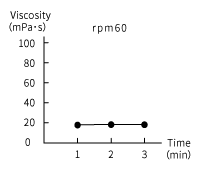Whether carbonated drinks on a hot summer day, a glass of tart 100% orange juice to beat fatigue, and unsweetened beverages when cutting back on sugar, there are many different types of beverages in the world.
A study published in the American Journal of Clinical Nutrition "Empty Calories and Phantom Fullness," they compared two drinks of the same caloric and nutritional content with varying viscosity and found that viscosity determined one's fullness rather than the caloric or nutritional contented.
Additonally, a journal published by The Japan Society of Cookery Science "Effects of Drink Viscosity on Nodogoshi" found that in addition to flavors tasted on the tongue, nodogoshi sensation of liquid passing through the throat is important and nodogoshi influences the likings. Nodogoshi varies with age and it is known that younger age group prefers less viscous liquids whereas older age group tend to like more viscous liquids.
Furthermore, posture when drinking is said to influence how the viscosity is felt. Drinking with the chin up and head tilted as when one is drinking out of a bottle, versus drinking with a straw will feel differently as it goes down the throat. Even beverages that one may not think it has much to do with viscosity will have slight differences from one product to another.
Viscosity of Peach Juice
VISCO™ measurement examples
Spindle : ULA
Sample temperature : 30℃

Customer comments
A manufacturer of various beverages and milk products who have been using ATAGO refractometers in their lab and field demonstrated VISCO™ as soon as it was released. They commented that they had never seen a viscosity meter that is so easy to use and can take stable measurements regardless of where the measurements are taken. They were also very impressed about its compact size.